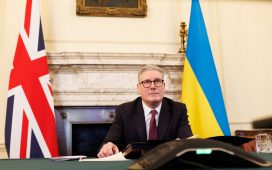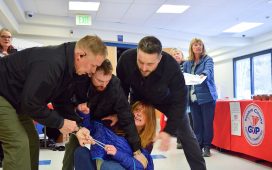When Jonathan Wittenberg, a British rabbi, posted a âstatement on Rafahâ on the website of the community he leads last week, he had no idea of the response it would generate.
âIt never occurred to me that it would go beyond those it was intended to reach,â he told the Observer. Much of the response from within Masorti Judaism, a traditional branch of the Jewish faith, had been supportive, but there had also been âtough feedbackâ from Jews outside the UK in particular. Wittenberg said he âwell understoodâ it.
His statement included condemnation of Hamasâs âbarbarity and strategic crueltyâ and contempt for human life alongside a lament over the âgrief and unbearable Âsufferingâ of Palestinians in Gaza.
But his words were, he wrote, prompted by âdeep concern over Israelâs Âpotential actions in Rafah, making it Âimpossible to remain silentâ. He was praying for an end to âappalling bloodshedâ on both sides.
News outlets in Israel and the US swiftly picked up the Âstatement, with Wittenberg described as âpossibly the Âhighest-profile European Jewish leader to express misgivings about Israelâs war in Gazaâ since Hamasâs attack on Israel on 7 October.
âIt hadnât occurred to me that other rabbis hadnât spoken in a Âsimilar manner. I hadnât Ârealised that Iâd be saying something which was considered outspoken or Âcourageous,â he said.
Wittenberg stressed his deep Âconnections to and staunch Âsupport of Israel. The atrocities Âcommitted by Hamas on 7 October were âunspeakable, calculated, utterly cruel and cunningâ, and the fate of the hostages unimaginable.
But, he added, âhuge numbers of Palestinian civilians are trapped in the middle. Israel is not at war with the Palestinian population but with Hamas.â Ordinary people were suffering, and more than a million were trapped in Rafah with nowhere to go.
His statement said: âJudaism has, throughout its history, stressed our duty to refugees and the helpless. How can we be unmoved by [Palestinian civiliansâ] grief and unbearable suffering?â
Jewish teaching to love and care for the stranger went hand in hand with the Jewish experience of being marginalised, persecuted and exiled â âand indeed having Âgenocide practised against usâ, he told the Observer.
A major military offensive in Rafah without adequate protection for civilians could ârebound against Israel and haunt Jewsâ for years to come. âHamas doesnât care about the cost in lives â instead it cynically blames Israel. But my worry is that violence leads to more violence, and [may] engender yet more hatred.â
In the UK, a shocking explosion of antisemitism since 7 October was revealed last week in figures released by the Community Security Trust that showed anti-Jewish abuse and attacks surged by 589% in 2023 compared to the year before. This month, a Leeds rabbi and his Âfamily were forced into hiding after Âreceiving death threats over his reserve duty in the Israeli military. A London theatre apologised after a comedian reportedly abused and hounded out a Jewish man in the audience who refused to applaud a Palestinian flag. Wittenbergâs local MP, Mike Freer said he was leaving Parliament at the next Âelection after death threats and repeated abuse. Wittenberg came out of his local underground station recently to find a drunk man shouting: âKill the Jews.â
âJews are feeling isolated and lonely in the workplace, Jewish Âstudents are intimidated on campus and Jewish children donât feel safe in schools,â said Wittenberg. âThis is outrageous, and a threat to the whole of society.â
On Friday, in a second Âmessage to Âmembers of his community, Wittenberg said Jews felt âÂbullied, maligned, threatened, Âintimidated and alone ⦠I canât count the Ânumber of people across the Âprofessions who tell me theyâve been Âsurrounded by a wall of silence, or outright hostility, whoâve felt let down or betrayed by Âcolleagues and former friends.â Israel was being âhorribly demonisedâ.
But there was compassion for people in Gaza, he told the Observer. âIn my community, Âpeople â Âparticularly young people â are extremely anxious about the level of suffering.â His statement on Rafah echoed the mood of many of them, he said.
From his work with families on both sides of the Israeli-Palestinian conflict who have lost loved ones in violence, Wittenberg said he understood both the need and possibility of ârecognising each otherâs painâ. Jews and Muslims were united by fear and anguish; âstanding together is supremely importantâ.
But right now it was also very Âdifficult, he acknowledged. His hopes and prayers were focused on a âserious political interventionâ to permanently remove Hamas from Gaza, to make significant moves towards a Palestinian state, and to ensure âdignity and securityâ for both sides: âIÂ know so many people in Israel and across the boundaries who want to be able to live together in the long run, and thatâs the only Âsolution in the end.â












